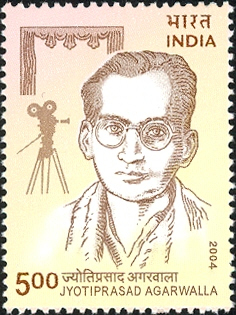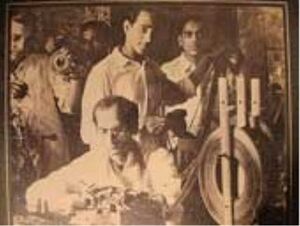Jyoti Prasad Agarwala facts for kids
Quick facts for kids
Jyoti Prasad Agarwala
|
|
|---|---|

Agarwala on a 2004 stamp of India
|
|
| Born | 17 June 1903 Tamulbari Tea Estate, Dibrugarh District, Assam
|
| Died | 17 January 1951 (aged 47) |
| Nationality | Indian |
| Other names | 'Rupkonwar' |
| Occupation | Film producer, director, Music composer, Poet, Dramatist, Writer |
| Years active | 1932–1951 |
| Spouse(s) | Devajani Bhuyan |
| Children | 7 |
Jyoti Prasad Agarwala (born June 17, 1903 – died January 17, 1951) was a very important Indian artist from Assam. He was a talented playwright, songwriter, poet, writer, and filmmaker. People in Assam loved his creative work and called him Rupkonwar, which means 'Prince of Beauty'. He is even known as the person who started Assamese cinema because he made the first Assamese film, Joymoti, in 1935. Every year, on January 17, people celebrate his life on Silpi divas, or Artists' Day.
Contents
Biography

Jyoti Prasad Agarwala was born on June 17, 1903. His parents were Paramananda Agarwala and Kiranmoyee Devi. He was born at Tamulbari Tea Estate. His family, the Agrawals, came from the Marwar region in Rajasthan in 1811. His uncles, Chandra Kumar Agarwala and Ananda Chandra Agarwala, were also famous Assamese poets.
Jyoti Prasad studied in different schools in Assam and Calcutta. He finished high school in 1921. In 1926, he went to Edinburgh to study economics. However, he came back in 1930 before finishing his studies. On his way home, he spent seven months in Germany. There, he learned about filmmaking at the UFA studio.
After returning to Assam, he became very active in India's fight for independence. This work had actually stopped his studies earlier. In 1932, he was put in jail for fifteen months because of his independence activities.
He then built his own film studio called Chitraban Studio. It was located at the Bholaguri Tea Estate. Around the end of 1933, he started filming Joymoti. This movie became the very first film made in Assam.
The film Joymoti was released in 1935. It was based on a play by Laxminath Bezbarua. The story was about a brave Ahom princess named Sati Joymoti. She was imprisoned and tortured by a cruel king.
In 1936, Jyoti Prasad married Devajani Bhuyan. He continued to be involved in the freedom movement. In 1942, he had to go into hiding to avoid being caught by the British. Towards the end of his life, his artistic ideas changed. He moved from romantic themes to more serious and radical ones. These new ideas were seen in his later works.
Jyoti Prasad Agarwala passed away from cancer on January 17, 1951. He died at his home, Poki, in Tezpur, Assam, India.
Works
Jyoti Prasad Agarwala created many different types of art. He wrote stories, plays, songs, and poems. He also made films.
Short Stories
Here are some of his short stories:
- Rupohi (ৰূপহী)
- Bogitora (বগীতৰা)
- Xontora (সোণতৰা)
- Xuntir Abhimaan (সোণটিৰ অভিমান)
- Zuzaru (যুঁজাৰু)
- Xotir Xuworoni (সতীৰ সোঁৱৰণী)
- Xondhya (সন্ধ্যা)
- Pratnatattikar Kalaaghumati (প্ৰত্নতাত্ত্বিকৰ কলাঘুমটি)
- Neela Charai (নীলা চৰাই)
Novel
He wrote one novel:
- Amar Gaon (আমাৰ গাঁও)
Other Books
Some of his other books include:
- Jyotidhara (জ্যোতিধৰা)
- Chandrakumar Agarwala (চন্দ্ৰ কুমাৰ আগৰৱালা)
- Background of Assamese Architecture (অসমীয়া শিল্পকলাৰ ইতিহাস)
Children Literature
Jyoti Prasad Agarwala also wrote about thirteen poems for children. One of his well-known children's poems is Kumpur Xopon (কুম্পুৰ সপোন).
Songs
He wrote over 300 songs. He also composed the music for many of them himself. All these songs together are known as Jyoti xongit (জ্যোতি সংগীত).
Plays
He wrote several plays, which are like scripts for stage shows:
- Sonit Kunwori (শোণিত কুঁৱৰী) (1925)
- Karengar Ligiri (কাৰেঙৰ লিগিৰী) (1930)
- Rupalim (ৰূপালীম) (1938)
- Nimati Konya (নিমাতী কইনা) (1964)
- Xonpokhilee (সোণপখিলী)
- Khanikar (খনিকৰ) (1977)
- Lobhita (লভিতা) (1945)
Incomplete Plays
Some plays he started but did not finish are:
- Kanaklata (কনকলতা)
- Sundarknowar (সুন্দৰ কোঁৱৰ)
- Sonpakhilee (সোণপখিলী)
Film
Jyoti Prasad Agarwala is celebrated as the person who started cinema in Assam. He made two important films:
- Joymoti (জয়মতী) (1935)
- Indramalati (ইন্দ্ৰমালতী) (1939)
Poems
He also published collections of his poems:
- Jyoti Raamaayon (জ্যোতি ৰামায়ণ) – Poetry Collection
- Luitor Paaror Agnixur (লুইতৰ পাৰৰ অগ্নিসুৰ) – Poetry Collection, 1971
Stamp
To honor Jyoti Prasad Agarwala's important work in Assamese literature and film, the Government of Assam released a special postage stamp with his picture in 2004. This stamp was suggested by the AGP political party and approved by the Prime Minister of India in mid-2004.
See also
- Jyoti Chitraban Film and Television Institute
- Assamese literature
- List of Assamese writers with their pen names
 | William Lucy |
 | Charles Hayes |
 | Cleveland Robinson |


